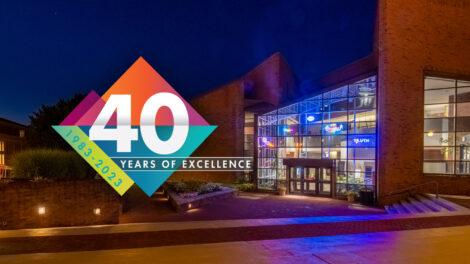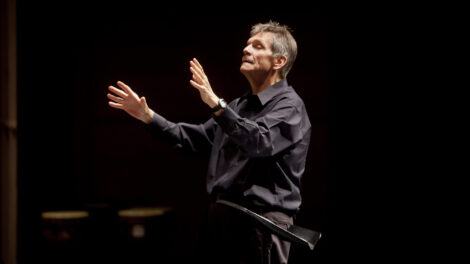Lafayette’s Max Kade Center for German Studies and Max Kade Haus celebrate milestone anniversaries
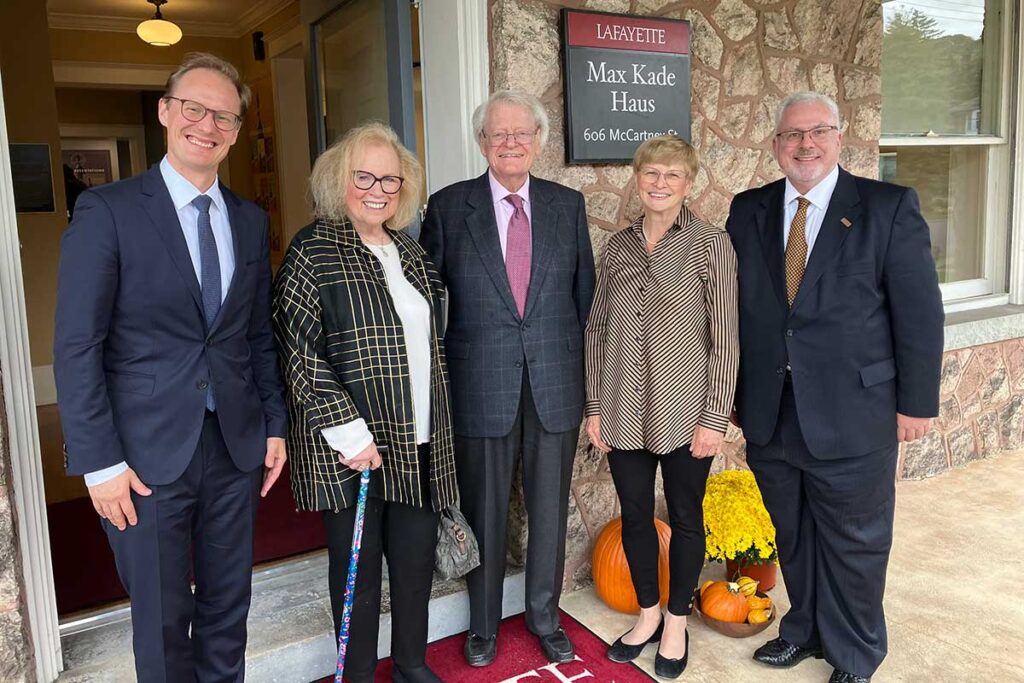
From left to right: Dennis Johannßen, assistant professor of German at Lafayette College; Lya Pfeifer, Max Kade Foundation president; Joseph Pfeifer, Liederkranz Foundation president; Margarete Lamb-Faffelberger, professor emerita of languages and literary studies, and director of Lafayette College’s Max Kade Center for German Studies; and Maurice Luker III, executive director of corporate, foundation, and government relations at Lafayette College
By Stella Katsipoutis-Varkanis
This year, Lafayette College celebrates both the 20th anniversary of the Max Kade Center for German Studies and the fifth anniversary of the Max Kade Haus. Since their establishment—thanks to the generous support of the Max Kade Foundation and the dedication of passionate faculty—the Center and Haus have emerged as hubs of German-centered educational, scientific, and cultural programs and exchanges at Lafayette that have set the bar for higher education institutions throughout the nation.
The anniversaries were commemorated with a reception at the Max Kade Haus on Oct. 19, which celebrated the guest of honor, Lya Pfeifer, president of the Max Kade Foundation, and brought together Lafayette campus community members for a discussion about the future of German programming at the College.
“We have made our Max Kade Center an integral part of teaching and learning of German at Lafayette, and that’s what makes us distinctive,” says Margarete Lamb-Faffelberger, professor emerita of languages and literary studies, and director of the Max Kade Center for German Studies.
Since 2020, Dennis Johannßen, assistant professor of German, has been working in partnership with Lamb-Faffelberger to continue to expand the vision for Max Kade programming. Through collaborations with departments and programs such as Jewish studies, Africana studies, film and media studies, international affairs, history, government and law, and engineering, the German program offers excellent and inclusive German language studies focused on a global and transnational curriculum. Situating the histories and cultures of Germany, Austria, and Switzerland within the broader contexts of global German-speaking communities, the German program and the Max Kade Center provide Lafayette students with a transformative international education and opportunities for enriching transatlantic exchange.
“The Max Kade Center is essential for realizing the ‘pipeline’ or ‘pathway’ to excellence in student experience in German studies and international education,” Johannßen says. As it states in the German program’s vision statement, he adds, the Center “fosters genuine enthusiasm about German language and contemporary German-speaking culture in a global and practical context.”
Lamb-Faffelberger—the renowned scholar of German language and culture who was awarded funding from the Max Kade Foundation to found the Center in 2003, and who worked ceaselessly to transform German studies at Lafayette into an internationally recognized program of teaching, learning, and research—explains that Max Kade programming at Lafayette helps carry out the vision of the College’s founding fathers. Article X of Lafayette’s charter and statutes explicitly states that a professorship of the German language “shall forever be maintained” at the College.
“Easton had a large German-speaking population, and it was important to the citizens of Easton to found a college where the language was taught,” Lamb-Faffelberger says. Easton’s powerful connections to German culture and heritage remain to this day, and they are continued and celebrated through the work of Lafayette’s ever-expanding Max Kade and German programming.
Max Kade Center for German Studies
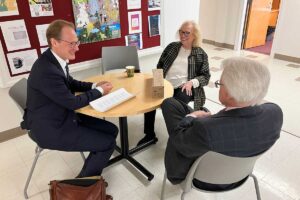
Dennis Johannßen, Lya Pfeifer, and Joseph Pfeifer discuss the future of German at Lafayette
Housed in a newly renovated room in historic Pardee Hall, the Max Kade Center for German Studies seeks to offer a forum in which students, faculty, and the public at large can gain a greater understanding of the histories, the cultures, and the political, economic, and social developments of global German-speaking communities and their impact on the past, present, and future of the United States. Each year, the Center invites renowned German-speaking scholars, writers, and artists from across the globe to campus through the Max Kade Writer-in-Residence, Distinguished Lecturers, and Professor-in-Residence programs.
Recent Writers-in-Residence and guest speakers, invited by Johannßen since 2020, have included award-winning novelist and political activist Sharon Dodua Otoo and Baku-born bestselling author and essayist Olga Grjasnowa. In 2022, Tiffany N. Florvil, associate professor of history at University of New Mexico and author of Mobilizing Black Germany, delivered a lecture at Lafayette that examined the artistic and cultural work of Black German women, and how that work was inextricably linked to the political work that allowed them to articulate demands for equity and antiracism in and beyond Germany. Scholars such as Peter Pulzer, Gladstone Professor Emeritus of Government and Public Administration and Fellow at Oxford University; Michaela Holdenried, professor of modern German literature at Albert-Ludwigs-Universität Freiburg; and Erhard Roy Wiehn, professor emeritus of history and sociology at University of Constance, taught and lectured as Max Kade visiting professors at Lafayette.
What’s particularly special about these guests, Lamb-Faffelberger and Johannßen explain, is that they cross borders in their work. While they hail from across various regions, languages, backgrounds, and disciplines, they write primarily in German and substantially engage with the transformation of cultural and sociopolitical landscapes in Germany and Europe. The Max Kade programming, they add, is thus in line with President Nicole Hurd’s stated interest in strengthening the College’s local, regional, and global connections, and making interdisciplinarity and innovation prominent aspects of the curriculum.
“Every guest we’ve invited has, in meaningful ways, been integrated into our academic mission, teachings, and course offerings,” says Lamb-Faffelberger. “We design seminars around the themes and topics that are covered in their work, and they collaborate with students and faculty as mentors on course units and projects such as creative writing assignments. And, oftentimes, the writers’ stay with us is infused into their work.”
One of the most powerful examples of this, Lamb-Faffelberger says, was a past series of symposia titled “The Austrian-American Podium Dialog,” which the Center hosted in 2013, 2015, and 2018, and for which a total of 12 Austrian writers came to Lafayette for a long weekend. “The students in my literature and culture seminar read the authors’ works and Skyped with some of them prior to their arrival,” Lamb-Faffelberger says. “During the symposia, the students attended all readings, took part in the discussions, and interviewed the authors about their work. We selected significant segments of our students’ conversations to appear in the anthology PASSAGES: Crossings • Borders • Opening, published in 2022, which documents the symposia and features literary pieces by the authors in the original German and English translation.”
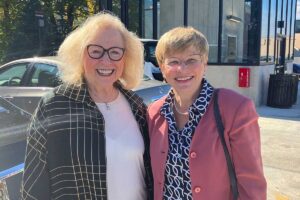
Over the last two decades, Margarete Lamb-Faffelberger (right) has transformed German studies at Lafyette into an internationally recognized program. Through the strong relationship she built with the Max Kade Foundation, Lamb-Faffelberger founded and advanced the Max Kade Center for German Studies and the Max Kade Haus at Lafayette. Here, she smiles alongside Lya Pfeifer (left), president of the Max Kade Foundation, whose generous support has enabled the College’s Max Kade programming to set the bar for higher ed German programs across the U.S.
Lamb-Faffelberger goes on to explain that German studies is, by nature, an interdisciplinary field: “So much of what happens in central Europe—politics, science, history, art—ties to other regions and debates in the world. Over the years, the Center has hosted scholars from all disciplines. Moreover, Lafayette College recently forged ties with the University Alliance Ruhr (UAR) in Germany and welcomed the first German intern to campus last summer. Annika Hesse was welcomed by Sustainability Director Delicia Nahman to work in the Office of Sustainability, where she helped establish the campus thrift store. This partnership with the UAR will also open the door to allow Lafayette students to become interns in Germany.”
Support from the Max Kade Foundation has helped fund Lafayette’s immersion study abroad opportunities in Germany, in particular the three-decade-long affiliation with the Academy of International Education in Bonn, which hosts not only the Green Europe: Cultures of Sustainability in Germany, Switzerland, France, and the Czech Republic language and culture immersion program, but also the semester-long study abroad program for Lafayette’s engineering students.
Max Kade Haus
Located at 606 McCartney St. in Easton and just steps away from Lafayette’s main campus, Max Kade Haus is a beautifully restored residence and meeting space that serves as home to guests of the various Max Kade resident programs at the College. The upper level features a fully furnished apartment with a fully functioning kitchen, two individual private bedrooms, and a bathroom, while the stately meeting and reception spaces on the lower level have hosted events ranging from meetings with local corporate business leaders and politicians to discussions with artists, scientists, engineers, social scientists, and humanists. A welcoming outdoor deck in the backyard was recently added to the Haus, also thanks to the generous funding of the Max Kade Foundation.
“The Haus is available to anyone on campus—not just to those in the German Studies program,” Lamb-Faffelberger says. “It’s open to guests of the College who require temporary living arrangements, as long as they have some sort of connection to the German-speaking world. For example, Joshua Rifkin, a world-renowned Johann Sebastian Bach scholar and the Wendy and Alan Pesky ’56 Visiting Artist-in-Residence at Lafayette, is currently staying at the Haus. The event space, however, is available to the entire campus. We’ve had numerous Williams Center pre-concert events take place there, and we would love to welcome even more Lafayette community members to consider the space for their upcoming academic events.”
Lamb-Faffelberger says she is proud of how much Lafayette’s German program has grown in both depth and breadth through the generous support of the Max Kade Foundation since 2003, and she is truly excited about the vision for the future of German at Lafayette: “It has the potential to be much more, and play an even stronger part in furthering the mission of the institution and President Hurd’s strategic vision. However, the recruitment of additional permanent faculty will be critical for success. There are so many possibilities for our students and faculty. All the pieces are in place, and we are ready to move forward. The sky is the limit.”
